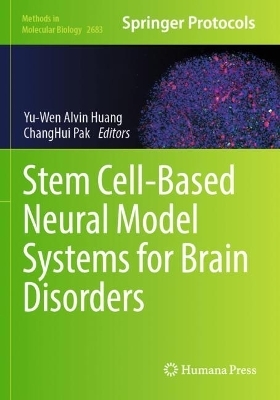
Stem Cell-Based Neural Model Systems for Brain Disorders
Springer-Verlag New York Inc.
978-1-0716-3289-5 (ISBN)
Authoritative and practical, Stem Cell-Based Neural Model Systems for Brain Disorders serves as an essential resource for researchers and students in neuroscience, stem cell biology, and related fields.
Generation of Cerebral Cortical Neurons from Human Pluripotent Stem Cells in 3D Culture.- Generation of Homogeneous Populations of Cortical Interneurons from Human Pluripotent Stem Cells.- Generation and Co-Culture of Cortical Glutamatergic and GABAergic Induced Neuronal Cells.- Transcription Factor-Directed Dopaminergic Neuron Differentiation from Human Pluripotent Stem Cells.- Directed Differentiation of Human iPSCs into Microglia-Like Cells Using Defined Transcription Factors.- The Generation and Functional Characterization of Human Microglia-Like Cells Derived from iPS and Embryonic Stem Cells.- Modeling Cellular Crosstalk of Neuroinflammation Axis by Tri-Cultures of iPSC-Derived Human Microglia, Astrocytes, and Neurons.- Generation of Oligodendrocytes from Human Pluripotent and Embryonic Stem Cells.- Characterizing the Neuron-Glial Interactions by the Co-Cultures of Human iPSC-Derived Oligodendroglia and Neurons.- Defined Differentiation of Human Pluripotent Stem Cells to Brain Microvascular Endothelial-Like Cells for Modeling the Blood-Brain Barrier.- Modeling the Blood-Brain Barrier Using Human Induced Pluripotent Stem Cells.- A Three-Dimensional Primary Cortical Culture System Compatible with Transgenic Disease Models, Virally-Mediated Fluorescence, and Live Microscopy.- Method to Generate Dorsal Forebrain Brain Organoids from Human Pluripotent Stem Cells.- A 3D Bioengineered Neural Tissue Model Generated from Human iPSC-Derived Neural Precursor Cells.- FACS-Based Sequencing Approach to Evaluate Cell Type to Genotype Associations Using Cerebral Organoids.- Dynamic Measurement of Endosome-Lysosome Fusion in Neurons Using High-Content Imaging.- Live-Imaging Detection of Multivesicular Body-Plasma Membrane Fusion and Exosome Release in Cultured Primary Neurons.- Assays of Monitoring and Measuring Autophagic Flux for iPSC-Derived Human Neurons and Other Brain Cell Types.- Measuring Neuronal Network Activity Using Human Induced Neuronal Cells.- A Simple Ca2+-Imaging Approach of Network-Activity Analyses for Human Neurons.- Whole Cell Patch Clamp Electrophysiology in Human Neuronal Cells.- Assaying Chemical Long-Term Potentiation in Human iPSC-Derived Neuronal Networks.
| Erscheinungsdatum | 12.06.2024 |
|---|---|
| Reihe/Serie | Methods in Molecular Biology |
| Zusatzinfo | 1 Illustrations, black and white; XIII, 292 p. 1 illus. |
| Verlagsort | New York, NY |
| Sprache | englisch |
| Maße | 178 x 254 mm |
| Themenwelt | Medizin / Pharmazie ► Studium |
| Naturwissenschaften ► Biologie ► Genetik / Molekularbiologie | |
| Naturwissenschaften ► Biologie ► Humanbiologie | |
| Naturwissenschaften ► Biologie ► Zoologie | |
| Schlagworte | Disease Modeling • drug discovery • Neural cell types • Neurophysiological conditions • Neuroscience • pathogenesis |
| ISBN-10 | 1-0716-3289-2 / 1071632892 |
| ISBN-13 | 978-1-0716-3289-5 / 9781071632895 |
| Zustand | Neuware |
| Informationen gemäß Produktsicherheitsverordnung (GPSR) | |
| Haben Sie eine Frage zum Produkt? |
aus dem Bereich


